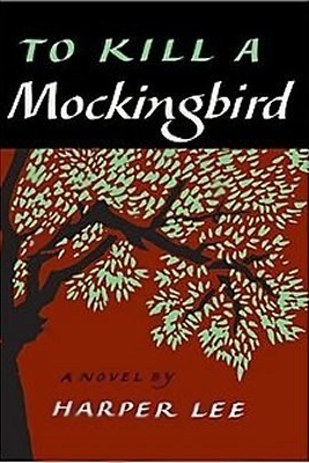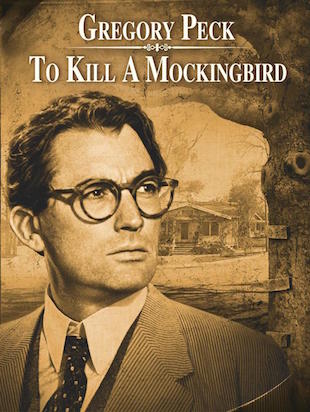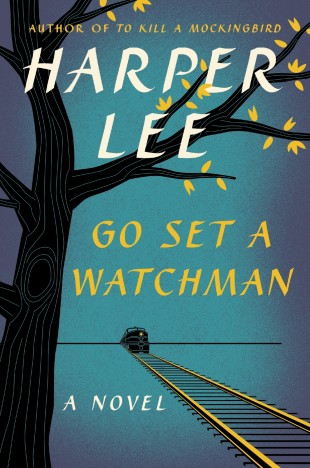Yes, Harper Lee’s “Go Set a Watchman” is out Tuesday and the Twitter-sphere is awash with the news that Atticus Finch is now a racist who once attended a Klan meeting etc. When I read Michiko Kakutani’s New York Times review of it on Friday I just about fell out of my chair. I couldn’t believe it. I about gagged. Obviously I wasn’t expecting Atticus to be turned into a racist and Jem to be dead in the new book. I’m not sure what I expected but surely it wasn’t a complete reversal of things in “To Kill a Mockingbird.”

Just last week I reread “To Kill a Mockingbird” to get myself ready for the new book. I revisited Jem, Scout, Dill, Atticus, Calpurnia, Boo Radley, and the small town of Maycomb, Alabama in the 1930s, and I thought the novel held up from when I read it in school. Scout as the six-year-old narrator is funny but sincere. She’s a tomboy who butts heads with authority and gets into fights at school with name-callers. I identified with her when I was younger. So many did. Atticus, too, was someone you looked up to. He stood for equal rights, justice and being a devoted father. He was a lawyer, defending Tom Robinson, a black man falsely accused of rape against a white woman. It wasn’t an easy time; the story is set in the Deep South during the Depression and times of racial inequality.

As soon as I finished the book, I rewatched the 1962 film of it, with Gregory Peck as Atticus. I had to see if everything was the same. The film condenses the book but maintains the essentials and keeps the ending. But while the novel deals more with the daily life and adventures of Scout and Jem in Maycomb, the film focuses more on Atticus and Tom Robinson’s trial. I mean if you had Gregory Peck for the role, wouldn’t you? Gregory Peck is Atticus, or was to me. The kid actors are wonderful too; I still laugh at Dill. The characters in the book are so relatable, and who hasn’t come upon a Boo Radley house or person? The story long ago had sunk into the American psyche, and I made myself familiar upon this second reading with even its smallest details.

And now — somehow — I need to wrap my head around everything surrounding Lee’s “Go Set a Watchman.” I’ve calmed down a bit since my initial reaction a few days ago. I must say since I just read “Mockingbird” and have good feelings from that, I feel less inclined to read “Watchman” right away. If Atticus is a racist and the story is a bit of a mess (from what I hear of the second half), do I really want to go down that path immediately?
I’m aware that apparently “Watchman” was a prototype or an early draft of “To Kill a Mockingbird,” though “Watchman” picks up the characters’ lives 20 years later. It’s hard to even reconcile how this early draft morphed into the eventual classic “To Kill a Mockingbird,” which indicted racism and became associated with the civil rights movement.
For now I’ll look at these novels as two separate creations of Lee’s. It seems she explored ways in which she sought to write her narrative — first, as an adult in New York coming home to a segregated South — and second as a child who hadn’t left her hometown yet. I sort of see the two Atticuses as separate people in the two books, and not one and the same person. (Maybe that’s just my way to deal with how opposite Atticus is in “Watchman” from “Mockingbird” — a transformation that obviously is bizarre and bewildering to so many.) If Lee’s goal was to write about the racial injustices she grew up with, the narratives in the “Watchman” and “Mockingbird” are definitely two different ways of doing it.
I still plan to read “Go Set a Watchman” but maybe not while “To Kill a Mockingbird” is so fresh in my mind. I’m curious about Lee’s theme of the alienation of a daughter returning home — as apparently, the main conflict in “Watchman” is Scout’s struggle in coming to terms with a father who is not who she believed he was. This could be an interesting theme — or then maybe not — if it fails to compel or is not done well.
Though many believe “Watchman” will forever change how we read or view “To Kill a Mockingbird” and Harper Lee, I still value the 1960 version for what it is on the page and the story it portrays.
What about you — what do you think about the two books and will you be reading “Go Set a Watchman”?

This is so upsetting to me! I can’t decide if I want to read the book or not.
Yeah I understand Kathy. I was quite upset too.
I keep going back and forth. Like you, I just re-read Mockingbird (and had an amazing experience), so it’s something I’m not sure I’m ready to cloud. At the same time, I feel like all this news has already clouded it, and I’d rather just read the book to experience it for myself. I have a library hold coming in today…I’m sure I won’t be able to resit it.
I’ll look for your review of it, Shannon. Right now I’m #563 out of 68 copies at the library here. Ha makes me laugh. I probably will wind up buying a copy.
I love how you revisited the book and the film before tackling Watchman. I’m 100 pages in myself and enjoying it more than I thought I would. I’m reading it more for the insight into her writing process. It’s fun to reconnect with Scout as an adult even if there is not much plot. I’m going to post a full review next week without spoilers, beyond the two you mentioned.
Okay Sarah, I’ll look for your review of it. I am curious to read it as well for the reasons you stated. Glad you are enjoying it.
I was supposed to get my book yesterday but it didn’t arrive. In the meantime I still have a few chapters of my reread of TO KILL A MOCKINGBIRD. I hope that GO SET THE WATCHMAN doesn’t spoil things forever to TKAM and future generations.
Yeah I understand Anne. I’m quite bewildered by the whole thing and not sure what to think. I hope you get your copy though.
I’ve been struggling all week too, but I work in an Indy bookshop and every single customer who has come in this week to buy the book has an opinion. One even brought up the old, old trope of TKAM being written by Truman Capote and not Lee!!
At least GSAW should prove this once and for all.
GSAW is the first draft, Lee’s first ideas on how to write a book on racial injustice and a father/daughter relationship loosely based on her own life (as my writer’s do esp with their first book).
I think I can now see GSAW as an interesting example of a writer at work.
This was the draft that the publishers said something like – great idea, close, but not quite, keep working it.
Apparently there are lines and sections that are copied straight from GSAW to TKAM, but Lee obviously tinkered a lot with character, plot, style, narrator etc between the two.
As someone who aspires to write, this could be a valuable resource in seeing how the editing & rewriting process actually works.
TKAM did not come out fully formed in one writing session. No book does.
Perhaps GSAW will help to highlight the work that writers actually do to create a book.
I wonder if GSAW is closer to Lee’s real-life relationship with her father? While TKAM is not only our wish-fulfillment in a father figure, but Lee’s as well?
Yeah Brona, I think there is likely merit in reading GSAW to see Lee’s writing process etc. I, too, wonder how or why the father figure changes so much between the two versions. Was TKAM a more softened version for the times it was published? Thanks for all your good comments.
Controversy certainly stirs things up, doesn’t it?
I had not read TKAM until the 50th anniversary came around, and I bought the book, with its lovely cover. I graduate high school before the time when it was on reading lists.
I then watched the movie….although I had seen bits and pieces of it before.
I bought Go Set a Watchman, a title that puzzles me…and will read it, keeping in mind that an adult’s perspective is so different from a child’s, and perhaps that will help me deal with any issues.
Thanks for your post…and here are MY WEEKLY UPDATES
I meant to say “graduated.” LOL
Thanks Laurel. I look forward to hearing what you think of “Watchman.” The title did puzzle me too, but then I read “Go Set a Watchman” comes from a passage in the King James Bible in Book of Isaiah. Not sure if it makes anything clearer, but I will keep it in mind when I read it.
I don’t think there’s anything wrong with waiting to read it. I do think that they need to be treated as completely separate books. I didn’t want GSAW to tarnish my love of TKAM and so I went into it with the mindset that this was a different book with different characters and that really helped me.
Thanks Melissa. Yeah that’s what I’ll do — think of the books separately as two different books. Glad you liked it, makes me still want to read it. 🙂
I read it earlier this week…and was upset by all the spoilers out there…especially by the NYT including such a big spoiler in the headline! There was no way to avoid it.
But, I’m glad I read it, but really consider it more of a curiosity than another Lee novel. Though I didn’t really like the book, it was certainly an interesting reading experience.
Yeah I think the spoilers were unavoidable. But I still want to read it. I was giving myself some breathing room after a re-read of Mockingbird but I think I’m ready this fall.
I read To Kill prior to reading Go Set this past August back-to-back and I was able to separate the two Atticus’ as the one doing his job in To Kill and the “real” Atticus coming out in Go Set and the one that Scout wasn’t privy to as a child. I look at this way, as children, depending on our childhood, idealize our parents and once we, as their children, become adults with our own life, realize what our parents really are. The facade is down because there is nowhere for our parents to hide. While they may not share everything that they struggle through, you start to realize that your parents are human and they may do things that you don’t exactly agree with. While Atticus may appear to be perfect in To Kill, we are seeing him through a child’s eyes and point of view and one finds out the true reality of Atticus in Go Set.
That’s a good point Melissa. I know what you mean. I will keep this mind when I read it sometime this fall. Thanks!